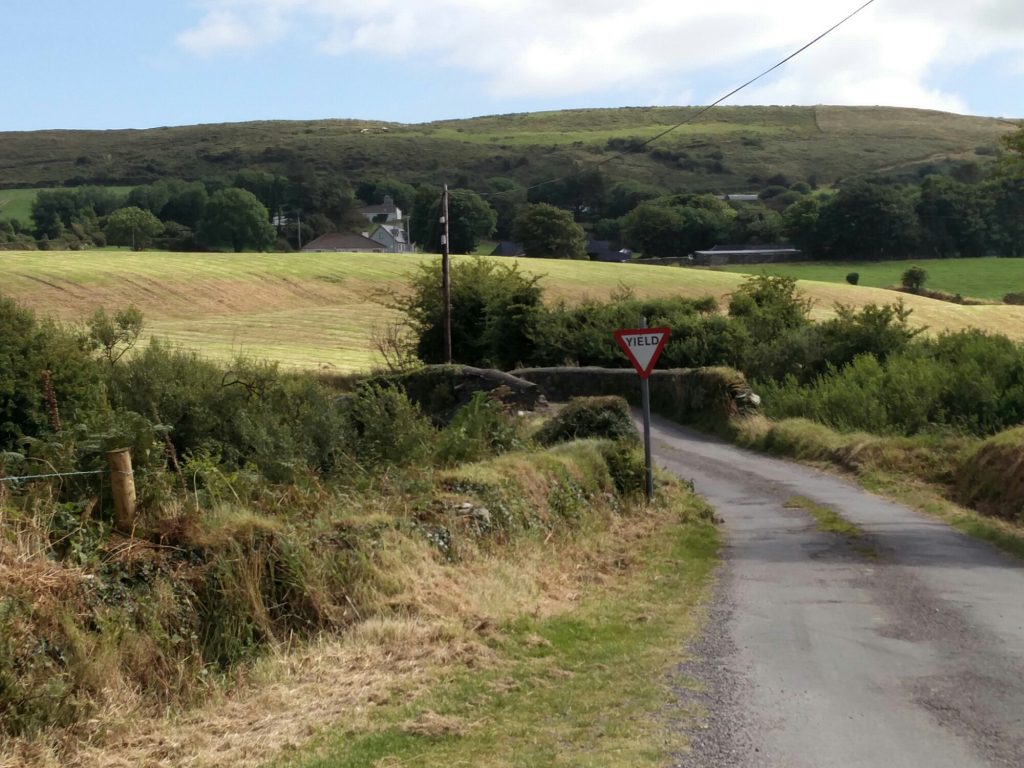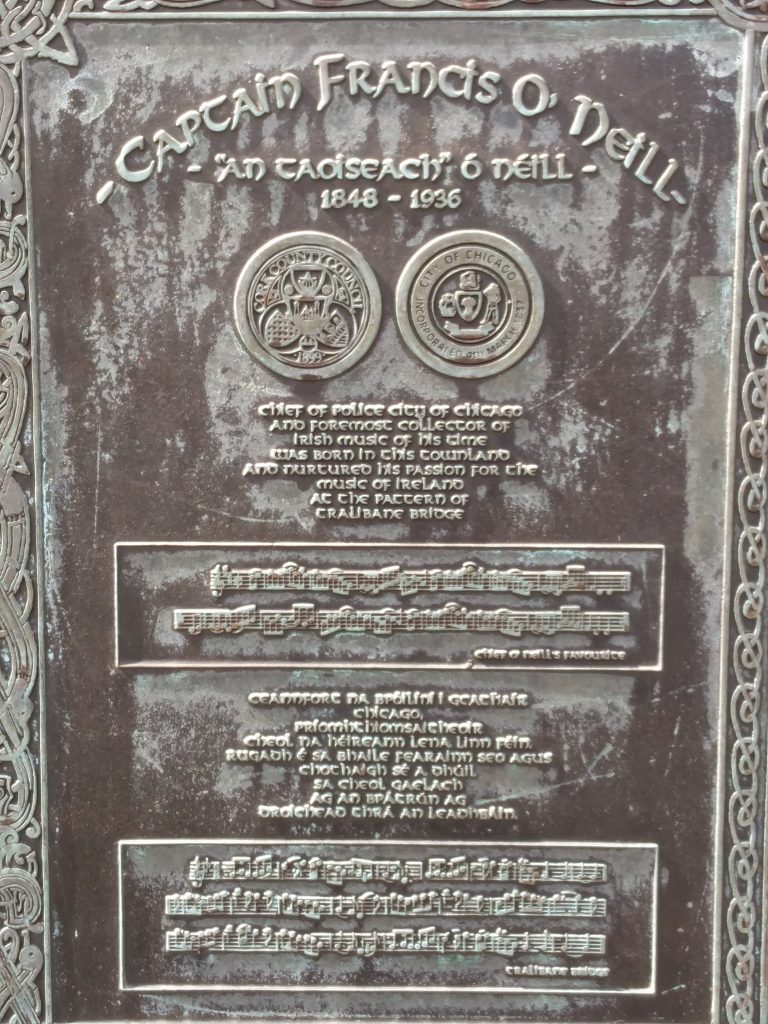The Tragedy of Tralibane Bridge

Down the hill from Francis O'Neill's homeplace of Tralibane, County Cork, is an 18th century stone bridge. If you closely read O'Neill's work, Tralibane bridge turns out to be personally very important to him, as a place and a tune. He wrote about the spot a number of times, particularly the "Pattern Dances" the community held there. No doubt this experience at a young age fostered his love of the music.
Photo top: Tralibane Bridge, County Cork
Below is pictured the plaque commemorating this history, placed near the bridge by Cork County Council and the City of Chicago. (How's that for alliteration!)

The plaque reads (in English and Irish):
Captain Francis O'Neill (1848-1936)
Chief of Police City of Chicago
And Foremost Collector of
Irish Music of His Time
Was Born in this Townland
And Nurtured His Passion for the
Music of Ireland
At the Pattern of
Tralibane Bridge
Two pieces collected by the Chief are inscribed: the famous hornpipe "Chief O'Neill's Favourite" and the air "Tralibane Bridge". The air isn't nearly as well known as the hornpipe but turns out to be personally very important to Francis O'Neill, and not just because it commemorates the bridge near where he grew up.
In Irish Folk Music: A Fascinating Hobby (available in full through the Internet Archive), Francis mentions the violinist I.S. Dunning:
In reviewing the Music of Ireland he tells us that the melody which captivated his fancy and that of his family above all others in the collection is "Tralibane Bridge." The fact that its haunting plaintiveness had made it also my choice is more than mere coincidence. When affliction beyond the power of pen to describe cast its withering blight on our home, this weird and fascinating air obsessed my waking hours for days unnumbered. To me no other strains in the whole range of wailing dirges so deeply touches the heart or so feelingly voices the language of sadness and despair
-- Irish Folk Music: A Fascinating Hobby [O'Neill - 1910] page 77
This passage is remarkable as Francis O'Neill was rarely given to deep expressions of feeling in his writing. Indeed, as outlined in a previous blog post, the tragedy of losing six of 10 children (particularly his cherished 18-year-old son Rogers) is barely mentioned in his memoirs. I believe that this "affliction beyond the power of pen to describe" was this loss, either of Rogers or when two of his children died on the same day. Unable to properly express the tragedy, it is expressed as an obsession with the tune 'Tralibane Bridge' -- a coping mechanism he only realizes years later.
On the next page, he reveals the following unusual story about the bridge:
Tralibane Bridge, ivyclad and ancient, spans a rocky, brawling river named on the maps Owennashingaun, in West Cork. Three townlands meet at this bridge, a significant circumstance to at least one disciple of the "black art," who one May morning at sunrise stood knee deep in the rushing current and performed certain mystic ceremonies. One consisted in dividing the waters with a scissors along the imaginary lines of the townland boundaries under the centre of the main arch. Whatever songs may have been sung to this touching air are lost as far as the writer has been able to ascertain.
-- Irish Folk Music: A Fascinating Hobby [O'Neill - 1910] page 78
What are we to make of this fascinating story, standing apart from the other anecdotes that make up the book? There were words to the air "Tralibane Bridge," but Francis, the avid collector with the encyclopedic memory, cannot recall them? Surely this means the event happened when he was young. Was this "disciple of the black art" a witch laying a curse on him as a young farm boy who spotted her under his favourite bridge? When terrible tragedy befell his family years later, perhaps he subconsciously felt cursed, expressed as an obsessive memory of the repressed tune.
You don't have to believe in magic to understand the psychological effects it can have upon those that do. Up until relatively recently, a folk belief in the power of curses or pishogues, persisted in rural Ireland. It would have been very prevalent in O'Neill's time. Certainly medical science back then wouldn't have had much in the way of explanation of his children's deaths. Although a firm believer in American progress (his personal notebooks full of clippings of scientific articles testify to this), perhaps he couldn't shake some of the old beliefs that linger in his memories of Tralibane bridge.
Note: This post can also be found in The Chief O'Neill blog, devoted to the fascinating life and music of Francis O'Neill (1848-1936) – the Chicago police chief who saved Irish music.
The Wild Geese Shop
Get your Wild Geese merch here ... shirts, hats, sweatshirts, mugs, and more at The Wild Geese Shop.
Irish Heritage Partnership
Adverts
Extend your reach with The Wild Geese Irish Heritage Partnership.
Top Content
Videos
© 2026 Created by Gerry Regan.
Powered by
![]()
Badges | Report an Issue | Privacy Policy | Terms of Service
You need to be a member of The Wild Geese to add comments!
Join The Wild Geese